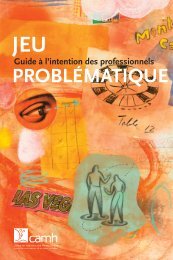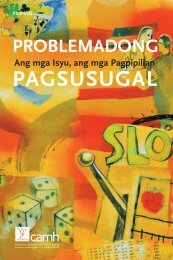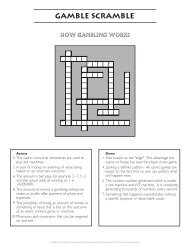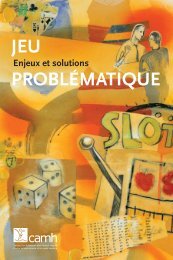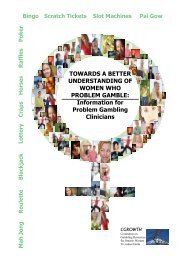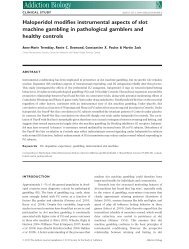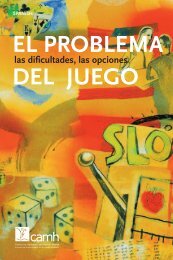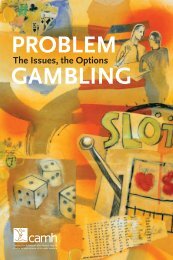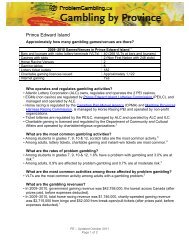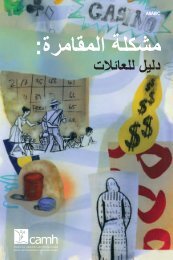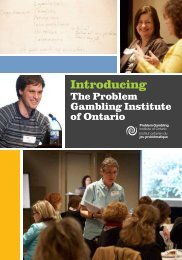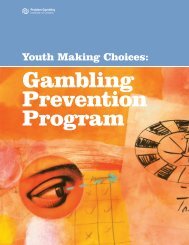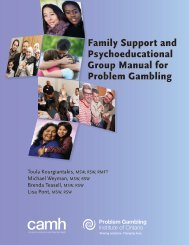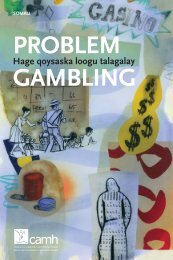Problem Gambling: A Guide for Helping Professionals
Problem Gambling: A Guide for Helping Professionals
Problem Gambling: A Guide for Helping Professionals
You also want an ePaper? Increase the reach of your titles
YUMPU automatically turns print PDFs into web optimized ePapers that Google loves.
PROBLEM<br />
A <strong>Guide</strong> <strong>for</strong> <strong>Helping</strong> <strong>Professionals</strong><br />
GAMBLING
<strong>Problem</strong> <strong>Gambling</strong>:<br />
A <strong>Guide</strong> <strong>for</strong><br />
<strong>Helping</strong> <strong>Professionals</strong><br />
A Pan American Health Organization /<br />
World Health Organization<br />
Collaborating Centre<br />
Affiliated with the University of Toronto
<strong>Problem</strong> <strong>Gambling</strong>: A <strong>Guide</strong> <strong>for</strong> <strong>Helping</strong> <strong>Professionals</strong><br />
<strong>Problem</strong> <strong>Gambling</strong> Project staff<br />
isbn 0-88868-495-9<br />
Printed in Canada<br />
Copyright © 2005, 2008 Centre <strong>for</strong> Addiction and Mental Health, Toronto ON<br />
No part of this work may be reproduced or transmitted in any <strong>for</strong>m or by any<br />
means electronic or mechanical, including photocopying and recording, or by<br />
any in<strong>for</strong>mation storage and retrieval system without written permission from<br />
the publisher—except <strong>for</strong> a brief quotation (not to exceed 200 words) in a review<br />
or professional work.<br />
2990/03-2005, 03-2008
Contents<br />
Acknowledgments 5<br />
Introduction 7<br />
1 Introduction to <strong>Gambling</strong> 9<br />
2 Talking about <strong>Gambling</strong> 25<br />
3 <strong>Problem</strong> <strong>Gambling</strong> Treatment Services 35<br />
4 Resources 41<br />
ontario’s specialized problem gambling services and resources 41<br />
other services 45<br />
suggested reading 47<br />
5 Client Handouts 49<br />
3
Acknowledgments<br />
This guide was developed by the Centre <strong>for</strong> Addiction and Mental Health<br />
<strong>Problem</strong> <strong>Gambling</strong> Project. We also received input from problem<br />
gambling counsellors and other helping professionals across Ontario<br />
who work with people affected by problem gambling.<br />
We would like to thank the following people who provided valuable<br />
feedback to us regarding the content of this handbook.<br />
Abi Sprakes<br />
Amber Kellen<br />
Colleen Franklin<br />
Staff of the Community Based Counselling Team,<br />
Family Services Thunder Bay<br />
Housing Liaison, Public Education and Advocacy<br />
Worker, The John Howard Society of Toronto<br />
Transition House<br />
Dr. Denise Preston Correctional Service of Canada,<br />
Millhaven Institution<br />
Farzana Doctor<br />
Michael Dean<br />
Pearly Daniel<br />
Manager, Centre <strong>for</strong> Addiction and<br />
Mental Health, Rainbow Services<br />
Manager, Withdrawal Management &<br />
Psychiatric Day Hospital Services,<br />
St Joseph’s Health Centre, Toronto<br />
Centre <strong>for</strong> Addiction and Mental Health,<br />
Spiritual and Religious Care Services<br />
<strong>Problem</strong> <strong>Gambling</strong>: A <strong>Guide</strong> <strong>for</strong> <strong>Helping</strong> <strong>Professionals</strong> was produced by<br />
staff of the Education and Publishing Department at camh.<br />
5
Other Resources in This Series<br />
<strong>Problem</strong> <strong>Gambling</strong>: A <strong>Guide</strong> <strong>for</strong> Families<br />
<strong>Problem</strong> <strong>Gambling</strong>: The Issues, the Options<br />
<strong>Problem</strong> <strong>Gambling</strong>: A <strong>Guide</strong> <strong>for</strong> Financial Counsellors<br />
<strong>Problem</strong> <strong>Gambling</strong>: Legal In<strong>for</strong>mation <strong>for</strong> <strong>Helping</strong> <strong>Professionals</strong><br />
<strong>Problem</strong> <strong>Gambling</strong>: Legal In<strong>for</strong>mation<br />
<strong>Problem</strong> <strong>Gambling</strong>: Legal In<strong>for</strong>mation <strong>for</strong> Families
Introduction<br />
This guide is <strong>for</strong> people who work in the “helping professions,”<br />
including addiction specialists, social and health care providers, workers<br />
in the criminal justice system, the clergy and employee assistance<br />
program counsellors.<br />
Many people who come to you may be struggling with serious financial,<br />
emotional, health and relationship problems related to problem gambling.<br />
It is also likely that they will not tell you about these problems—<br />
unless you ask.<br />
This guide has been developed to:<br />
• increase your knowledge of problem gambling, and your understanding<br />
of its impact on those who gamble and their families<br />
• give you the in<strong>for</strong>mation and tools you need to identify and support<br />
people with gambling problems<br />
• give you strategies to explore concerns about gambling and to prompt<br />
clients to take appropriate action<br />
• increase your knowledge of community supports and services that are<br />
available to people with gambling problems.<br />
7
<strong>Problem</strong> <strong>Gambling</strong>: A <strong>Guide</strong> <strong>for</strong> <strong>Helping</strong> <strong>Professionals</strong>
<strong>Problem</strong> <strong>Gambling</strong>: A <strong>Guide</strong> <strong>for</strong> <strong>Helping</strong> <strong>Professionals</strong><br />
1<br />
Introduction to <strong>Gambling</strong><br />
<strong>Gambling</strong> in Canada has grown at an unprecedented rate over the<br />
last decade and is an increasingly popular recreational activity. While<br />
gambling was once illegal, or viewed as a disreputable activity, social<br />
norms have shifted.<br />
<strong>Gambling</strong> is now a multi-billion dollar industry in Canada, and its growth<br />
is likely to continue. Surveys indicate that the general population favours<br />
funding charities, health care and other important initiatives through<br />
the funds raised from gambling. Generally, the public prefers this to<br />
increases in direct taxation.<br />
For some people, gambling may become a serious problem that affects<br />
all aspects of their lives. And as gambling becomes more accessible,<br />
the number of people affected by problem gambling also increases.<br />
9
<strong>Problem</strong> <strong>Gambling</strong>: A <strong>Guide</strong> <strong>for</strong> <strong>Helping</strong> <strong>Professionals</strong><br />
What Is <strong>Gambling</strong><br />
A person is gambling whenever he or she takes the chance of losing<br />
money or belongings, and when winning or losing is decided mostly<br />
by chance.<br />
There are many different ways to gamble, including:<br />
• casino games<br />
• bingo<br />
• keno<br />
• slot machines<br />
• lottery tickets<br />
• scratch, Nevada or pull-tab tickets<br />
• betting on card games, mah-jong or dominoes<br />
• betting on horse racing<br />
• other sports betting<br />
• betting on games of skill, such as golf or pool<br />
• tombola and similar games<br />
• Internet gambling<br />
• stock market speculation.<br />
facts about gambling in ontario and canada<br />
• In 2005, 63.3% of Ontario adults gambled at least once in the last year—<br />
usually with lottery tickets. The vast majority of people who gamble do<br />
so without problems. 1<br />
• The gaming industry in Canada generates more than $14 billion in<br />
revenues. Spending on gaming in Canada is larger than magazine, book,<br />
spectator sport, movie theatre and per<strong>for</strong>ming arts sectors combined. 2<br />
• Ontario has over 11,000 ticket lottery outlets—the most in North<br />
America. Ontario Lottery and Gaming (olg) operates 101 lottery games<br />
(16 online, 76 instant, four sports and five bingo). Online games remain<br />
the top revenue generators in the lottery division and account <strong>for</strong> 65% of<br />
overall olg lottery revenues. 3<br />
• In 2006, olg lotteries and bingo generated $2.4 billion in revenue<br />
(be<strong>for</strong>e prize deductions). 3<br />
10
Introduction to <strong>Gambling</strong><br />
(“Facts About <strong>Gambling</strong> in Ontario and Canada” continued)<br />
• In 2006, total commercial casino revenue was $1.7 billion. 3<br />
• Ontario’s four commercial casinos created more than 27,000 direct and<br />
indirect jobs. 4<br />
• Since 1998, six charity casinos have opened in the province. From these<br />
operations, Ontario charities are guaranteed $100 million annually. 4<br />
• Charity and casino racetrack slot machines generated $1.9 billion in revenue<br />
in 2006. 3<br />
• Since the opening of Ontario’s first slot machines in 1998 (Windsor<br />
Raceway), Ontario now has 17 racetracks with slot machines. As of 2006,<br />
Ontario racetracks housed more than 10,000 slot machines, which are<br />
played by almost 17,000 patrons per day. There are only five racetracks<br />
without slot machines in Ontario. The racing industry receives 10% of<br />
the revenue from slot machines. 3<br />
references<br />
1. Wiebe, J., Mun, P. & Kauffman, N. (2006). <strong>Gambling</strong> and problem gambling in Ontario.<br />
Toronto, ON: Responsible Gaming Council. Available: www.gamblingresearch.org/<br />
download.sz/1043%20Final%20Report%20POSTED%20VERSION.pdfdocid=7670.<br />
Accessed February 1, 2008.<br />
2. Canadian Gaming Association. (2007). National gaming impact study backgrounder.<br />
Available: www.canadiangaming.ca/media_uploads/pdf/53.pdf. Accessed February 8, 2008.<br />
3. Ontario Lottery and Gaming. (2006). OLG Annual report 2005–2006. Available:<br />
www.olg.ca/assets/documents/annual_report/annual_report_05-06.pdf. Accessed<br />
February 1, 2008.<br />
4. Ontario Lottery and Gaming. (n.d.). OLG website. Available: www.olg.ca/index.jsp.<br />
Accessed February 8, 2008.<br />
11
<strong>Problem</strong> <strong>Gambling</strong>: A <strong>Guide</strong> <strong>for</strong> <strong>Helping</strong> <strong>Professionals</strong><br />
What Is <strong>Problem</strong> <strong>Gambling</strong><br />
<strong>Problem</strong> gambling is not just about the loss of money, but how it can<br />
affect the person’s whole life. <strong>Gambling</strong> is a problem when it:<br />
• interferes with work, school or other activities<br />
• leads to emotional or physical health problems<br />
• causes financial problems<br />
• harms the family or other relationships.<br />
You may have heard the following terms, which have also been used<br />
to describe problem gambling:<br />
• gambling addiction<br />
• compulsive gambling<br />
• pathological gambling<br />
• gambling disorder.<br />
facts about problem gambling in ontario<br />
and canada<br />
• In 2005, 3.4% of adults had a moderate to severe problem with<br />
gambling. An additional 5.8% were classified as “at-risk” <strong>for</strong> problem<br />
gambling. 1<br />
• The number of clients being served by Ontario’s specialized treatment<br />
system is low but slowly increasing. 2<br />
• In 2005 about 4% of high school students were at risk <strong>for</strong> a gambling<br />
problem. The percentage of all students who gambled at cards significantly<br />
increased since 2003. 3<br />
• In 2005, one in seven adult men and women living alone spent money<br />
on casinos, slot machines or video lottery terminals, yet men spent more<br />
than three times as much money on gambling as women. 4<br />
• <strong>Problem</strong> gambling prevalence rates are higher <strong>for</strong> people with a history<br />
of mental illness or substance use problems. 5<br />
12
Introduction to <strong>Gambling</strong><br />
(“Facts About <strong>Problem</strong> <strong>Gambling</strong> in Ontario and Canada” continued)<br />
• In 2005, 9.6% of adults reported experiencing negative impacts by someone<br />
else’s gambling compared to 5.2% in 2001. Those affected by problem<br />
gambling often experience financial difficulty, emotional distress and<br />
relationship problems. 1<br />
• In 2005, adults experiencing severe problems with gambling spent roughly<br />
21% of their personal income on gambling compared to non problem<br />
gamblers who spent roughly 1.5%. 1<br />
references<br />
1. Wiebe, J., Mun, P. & Kauffman, N. (2006). <strong>Gambling</strong> and problem gambling in Ontario.<br />
Toronto, ON: Responsible <strong>Gambling</strong> Council. Available: www.gamblingresearch.org/<br />
download.sz/1043%20Final%20Report%20POSTED%20VERSION.pdfdocid=7670.<br />
Accessed February 1, 2008.<br />
2. Urbanoski, K.A. & Rush, B.R. (2006). Characteristics of people seeking help <strong>for</strong> problem<br />
gambling in Ontario: Trends from 1998–2002. Journal of <strong>Gambling</strong> Issues, 16.<br />
Available: www.camh.net/egambling/issue16/pdf/jgi_16_urbanoski.pdf. Accessed<br />
February 8, 2008.<br />
3. Centre <strong>for</strong> Addiction and Mental Health (2006). The mental health and wellbeing of<br />
Ontario students 1991–2005. (CAMH Research Document Series No. 18). Available:<br />
www.camh.net/Research/Areas_of_research/Population_Life_Course_Studies/OSDUS/<br />
OSDUS2005_mental_detailed_fnl.pdf. Accessed February 5, 2008.<br />
4. Statistics Canada. (2007). Perspectives on labour and income: <strong>Gambling</strong>. (Catalogue No.<br />
75-001-XIE). Available: www.statcan.ca/english/freepub/75-001-XIE/comm/01.pdf.<br />
Accessed February 1, 2008.<br />
5. Toneatto, T. & Millar, G. (2004). Assessing and treating problem gambling: Empirical<br />
status and promising trends. Canadian Journal of Psychiatry, 49 (8), 517–525. Available:<br />
ww1.cpa-apc.org:8080/publications/archives/CJP/2004/august/toneatto.pdf. Accessed<br />
February 11, 2008.<br />
13
<strong>Problem</strong> <strong>Gambling</strong>: A <strong>Guide</strong> <strong>for</strong> <strong>Helping</strong> <strong>Professionals</strong><br />
<strong>Gambling</strong> problems occur along a continuum. These are not discrete<br />
categories but possible points along a range of involvement.<br />
No Casual Serious Harmful Pathological<br />
<strong>Gambling</strong> Social Social Involvement <strong>Gambling</strong><br />
• No gambling: Some people never gamble.<br />
• Casual social gambling: Most people gamble casually, buying the<br />
occasional raffle or lottery ticket or occasionally visiting a casino <strong>for</strong><br />
entertainment.<br />
• Serious social gambling: These people play regularly. It is their main<br />
<strong>for</strong>m of entertainment, but it does not come be<strong>for</strong>e family and work.<br />
• Harmful involvement: These people are experiencing difficulties in<br />
their personal, work and social relationships.<br />
• Pathological gambling: For a small but significant number of people,<br />
gambling seriously harms all aspects of their lives. People with gambling<br />
problems this severe are unable to control the urge to gamble, despite<br />
the harm it causes. These people are more likely to use gambling to<br />
escape from problems and to get relief from anxiety.<br />
Pathways into <strong>Problem</strong> <strong>Gambling</strong><br />
This model was developed by Alex Blaszczynski to describe an integrated<br />
approach to understanding the entryways into problem gambling. More<br />
detailed in<strong>for</strong>mation can be found in his book, Overcoming Compulsive<br />
<strong>Gambling</strong> (1998). This approach takes into account the fact that not<br />
everyone who develops a gambling problem exhibits dsm-iv criteria,<br />
nor do they necessarily have an underlying or contributing pathology.<br />
People with gambling problems fall into three main categories.<br />
14
Introduction to <strong>Gambling</strong><br />
1. “Normal” problem gamblers are people whose entry into problem<br />
gambling is linked to environment and learning. It may have<br />
stemmed from an early win or cognitive distortions about true<br />
odds and probabilities. The gambler does not necessarily have<br />
pre-existing psychological problems.<br />
2. “Emotionally vulnerable” gamblers are people whose entry into<br />
problem gambling results from their difficulty in managing stress<br />
or crisis in their lives. They use gambling as an emotional mask<br />
and a way of avoiding underlying issues and current stresses.<br />
3. “Biologically based” gamblers are people who have impulse disorders,<br />
such as adhd, and are the most challenging in terms of treatment<br />
success. <strong>Gambling</strong> can also trigger other binge behaviours and,<br />
according to Blaszczynski, these people should receive counselling<br />
to deal with impulse control and should also explore antidepressant<br />
and other medication options with a psychologist or psychiatrist.<br />
<strong>Problem</strong> <strong>Gambling</strong> Affects People Differently<br />
Not all people who gamble excessively are alike, nor are the problems<br />
they face. People with gambling problems are found in all age groups,<br />
income groups, cultures and jobs. Some people develop gambling<br />
problems suddenly, others over many years. There are many reasons<br />
why a gambling problem may develop. For example, some people<br />
develop problems when they try to win back money they have lost, or<br />
because they like to be “in the action.” Others have many life stresses<br />
that make gambling a welcome relief.<br />
Risk Factors<br />
There are risk factors that can contribute to the development of gambling<br />
problems or make it more difficult to stop. People are more at risk if they:<br />
• have an early big win (leading to false expectations of future wins)<br />
• have easy access to their preferred <strong>for</strong>m of gambling<br />
• hold mistaken beliefs about the odds of winning<br />
• do not take steps to monitor gambling wins and losses<br />
15
<strong>Problem</strong> <strong>Gambling</strong>: A <strong>Guide</strong> <strong>for</strong> <strong>Helping</strong> <strong>Professionals</strong><br />
• have had a recent loss or change, such as divorce, job loss, retirement<br />
or death of a loved one<br />
• often feel bored or lonely, or have a history of risk-taking or impulsive<br />
behaviour<br />
• have financial problems<br />
• have few interests or hobbies, or feel their lives lack direction<br />
• have a history of mental health problems, particularly depression<br />
and anxiety<br />
• have been abused or traumatized<br />
• have a parent who also has (or has had) problems with gambling<br />
• have (or have had) problems with alcohol or other drugs, gambling<br />
or overspending<br />
• tie their self-esteem to gambling wins or losses.<br />
The more factors that apply, the more likely a person is to develop a<br />
gambling problem.<br />
Risk Groups<br />
Research into gambling problems suggests that some groups may be<br />
more at risk of developing problems or may experience greater harm<br />
because of their gambling behaviour.<br />
youth<br />
Research shows that teens are twice as likely as adults to have gambling<br />
problems. Easy access to gambling, its wide acceptance as a way to have<br />
fun, the perception that it is a quick way to a good life and the element<br />
of risk make gambling attractive to teens. The social, educational and<br />
emotional consequences are serious. <strong>Gambling</strong> in teens is correlated<br />
with poor academic and vocational per<strong>for</strong>mance, mental health problems,<br />
problems with alcohol or other drugs and high-risk behaviour.<br />
Long-term studies are not yet available to tell us if gambling in youth<br />
becomes a lifelong problem.<br />
16
Introduction to <strong>Gambling</strong><br />
older adults<br />
More seniors are gambling today than ever be<strong>for</strong>e. The gaming industry<br />
has recognized older adults as an important market and has introduced<br />
special promotions, cheap transportation and free lunches to encourage<br />
seniors to visit local casinos. Seniors enjoy gambling and report feeling<br />
safe in the brightly lit and well-supervised settings.<br />
Statistically, older adults are less likely to gamble and are at lower risk<br />
of developing gambling problems. When gambling is a problem,<br />
however, the consequences are often more severe, because seniors are<br />
less able to replace lost savings. Seniors who have recently lost a loved<br />
one, have health problems or who lack a strong social network or<br />
alternative work or leisure activities may be more at risk of experiencing<br />
problems if they choose to gamble.<br />
new immigrants<br />
Research suggests that recent immigrants may be at increased risk<br />
<strong>for</strong> developing gambling problems because of the stress of immigration,<br />
weakened social and familial relations, loneliness and isolation,<br />
financial difficulties, employment challenges, language and cultural<br />
barriers or a desire to achieve rapid financial success. Cultural factors<br />
shape beliefs about money and gambling; these beliefs need to be<br />
asked about, understood and factored into your relationship with the<br />
person seeking your help.<br />
aboriginal people<br />
Aboriginal people may be at increased risk <strong>for</strong> developing gambling<br />
problems because of the stresses associated with isolation, poverty,<br />
racism, oppression and the loss of culture and language. A study by<br />
the Ontario Federation of Indian Friendship Centres in 2000 found<br />
that 43 per cent of aboriginal people had significant problems with<br />
gambling. Many of these people were also dealing with grief. Cultural<br />
factors shape beliefs about money and gambling; these beliefs need<br />
to be asked about, understood and factored into your relationship<br />
with the person seeking your help.<br />
17
<strong>Problem</strong> <strong>Gambling</strong>: A <strong>Guide</strong> <strong>for</strong> <strong>Helping</strong> <strong>Professionals</strong><br />
low-income people<br />
Little is known about the gambling patterns of people with the lowest<br />
incomes in Ontario. Most studies have used telephone surveys, and<br />
many people with low incomes do not have telephones. One Ontario<br />
study found people with incomes of less than $20,000 per year were<br />
the most likely to experience problems with gambling, but they were<br />
also the least likely to gamble at all. They gamble less because they do<br />
not have the disposable income to do so. On the other hand, those<br />
that do may run into serious financial problems quickly because their<br />
incomes are low.<br />
women<br />
Women have gambling problems less frequently than men. But because<br />
their incomes tend to be lower, they may run into serious financial<br />
problems more quickly. On average, women still earn much less than<br />
men. Older women and single mothers are especially affected by poverty.<br />
Money pressures may be a greater motivation <strong>for</strong> women to gamble.<br />
Impact of <strong>Problem</strong> <strong>Gambling</strong><br />
People with moderate to severe gambling problems can experience<br />
serious social, emotional, financial and health consequences including:<br />
• significant financial loss<br />
• work-related difficulties including lower productivity, higher absenteeism<br />
and job loss<br />
• higher rates of emotional or health problems including depression,<br />
anxiety and problems with alcohol or other drugs<br />
• higher rates of suicide<br />
• higher rates of marital and family breakdown<br />
• engaging in illegal activities to support their gambling.<br />
18
Introduction to <strong>Gambling</strong><br />
People who gamble excessively will sometimes seek help <strong>for</strong> the<br />
financial, employment, relationship or health problems caused by<br />
their gambling without addressing the root cause of their problems.<br />
When the gambling behaviour is not addressed, these other problems<br />
often continue or worsen.<br />
impact on families<br />
Just as there are differing levels of gambling problems, families are also<br />
affected in various ways and to differing degrees. Because gambling<br />
can be hidden <strong>for</strong> a long time, many families are shocked when the<br />
full impact of the gambling loss is discovered. While some families<br />
are able to recover, not all are able to survive gambling problems.<br />
Rates of separation and divorce are significantly higher than in the<br />
general population.<br />
Here are some common problems that families face:<br />
Financial Crisis<br />
The most common negative impact is serious financial loss. <strong>Problem</strong>s<br />
may first appear as a sudden money crisis. Savings, property or<br />
belongings may be lost. Excessive spending on gambling often means<br />
that bills are not paid, utilities are cut off and money <strong>for</strong> necessities<br />
like groceries is in short supply.<br />
Hiding debt, stealing money and having secret gambling funds are<br />
not uncommon. The person who is gambling may not want his or her<br />
family to know the full scope of what is going on financially.<br />
Emotional Difficulties and Isolation<br />
Intense emotions within families are common and may make problemsolving<br />
difficult. Families may feel helpless and unable to see solutions<br />
to their problems. The person who gambles may even deny that there<br />
is a problem.<br />
19
<strong>Problem</strong> <strong>Gambling</strong>: A <strong>Guide</strong> <strong>for</strong> <strong>Helping</strong> <strong>Professionals</strong><br />
Isolation is another problem:<br />
• Many partners do not want to be emotionally or physically close with<br />
the person they no longer trust.<br />
• Many families and people who gamble avoid those who normally give<br />
them love and support because they feel ashamed.<br />
• Friendships may end because of unpaid debts, causing family conflict.<br />
Health <strong>Problem</strong>s<br />
The stress of gambling may cause health problems, both <strong>for</strong> the person<br />
who gambles and the family. Common problems include anxiety,<br />
depression and stress-related disorders such as difficulty sleeping,<br />
ulcers, irritable bowel, eating disorders, headaches, muscle aches and<br />
pains. Compared to the general population, people who gamble and<br />
their spouses are more likely to have problems with alcohol or other<br />
drugs. They are also three times more likely to attempt suicide.<br />
Burnout<br />
Many families under stress have trouble coping. One family member<br />
may try to keep things under control by taking on more tasks. This can<br />
lead to emotional and mental fatigue. Family members can become<br />
so focussed on the person who gambles that they <strong>for</strong>get to take care<br />
of themselves or have fun.<br />
Impact on Children<br />
When a parent or caregiver has a gambling problem, children can feel<br />
<strong>for</strong>gotten, neglected, depressed and angry. They may believe they<br />
caused the problem and that if they are “good,” the problem will stop.<br />
Some take on parenting roles, to compensate <strong>for</strong> the missing parent.<br />
They may feel <strong>for</strong>ced to take sides between fighting parents. Others<br />
may become depressed or get into trouble at school. Children of adults<br />
with gambling problems are two times more likely to attempt suicide<br />
and have lower grades than their peers. They are more likely to have<br />
problems with alcohol and other drugs than their peers and more<br />
likely to engage in illegal activity as a way of drawing attention away<br />
from their parents. Children may need help to understand that the<br />
problems in the family are not their fault and to return to the normal<br />
tasks of childhood.<br />
20
Introduction to <strong>Gambling</strong><br />
Older Adults May Be at Risk<br />
The person who gambles may demand money from older family<br />
members. He or she may also abuse power of attorney, misappropriate<br />
funds, steal possessions or <strong>for</strong>ce changes to the will in order to gain<br />
access to money or to pay off debts.<br />
Physical and Emotional Abuse<br />
Violence is more common when families are in crisis. <strong>Gambling</strong><br />
problems can lead to emotional and physical abuse of a partner, elder<br />
parent or child. Children may be hurt by the person who gambles or<br />
by the partner who releases his or her pent-up anger and frustration.<br />
If you suspect neglect, or emotional or physical abuse, you are obligated<br />
under the Child Welfare Act to report your suspicions to the<br />
appropriate authority.<br />
Depression and Anxiety<br />
Both people with gambling problems and their families are at risk <strong>for</strong><br />
anxiety and depression. Watch out <strong>for</strong> the signs and symptoms of<br />
depression and take steps to link the client to treatment.<br />
Symptoms of depression include:<br />
• loss of interest in usual activities<br />
• feeling depressed, lethargic and more irritable<br />
• changes in sleep (e.g., problems falling asleep, staying asleep or sleeping<br />
too much)<br />
• changes in appetite, weight loss or weight gain<br />
• feelings of helplessness, hopelessness and despair<br />
• difficulty thinking, remembering and slowed thoughts<br />
• guilty ruminations and obsessing over real or perceived problems<br />
• loss of interest in sex<br />
• physical fatigue, or agitation and restlessness<br />
• thoughts of suicide.<br />
21
<strong>Problem</strong> <strong>Gambling</strong>: A <strong>Guide</strong> <strong>for</strong> <strong>Helping</strong> <strong>Professionals</strong><br />
Risk of Suicide<br />
People who gamble excessively and their families have higher rates of<br />
suicide. The risk of suicide increases <strong>for</strong> people who also have mental<br />
health problems or problems with alcohol or other drugs. People who<br />
have threatened suicide or have a history of self-harm are also more<br />
at risk.<br />
Clients may have thoughts of suicide if they:<br />
• talk about suicide and say they have a plan<br />
• show changes in behaviour, appearance or mood<br />
• seem depressed, sad or withdrawn<br />
• give away prized personal objects<br />
• prepare <strong>for</strong> death by making a will or telling final wishes.<br />
Steps to take:<br />
• Stay calm and listen carefully to better understand what is happening.<br />
• Let them talk about their feelings. Accept what they are saying without<br />
passing judgment or trying to solve their problem.<br />
• Ask clients specifically if they are feeling suicidal and have a plan.<br />
• Take all suicide threats seriously.<br />
• Encourage clients to remove any available means of self-harm (e.g.,<br />
firearms, medications).<br />
• Direct clients to the nearest emergency department <strong>for</strong> assessment, or<br />
encourage them to get professional help from a crisis centre, counsellor<br />
or doctor.<br />
• Do not promise to keep the person’s suicidal thoughts confidential.<br />
22
Introduction to <strong>Gambling</strong><br />
Impact on the Community<br />
The cost of problem gambling is difficult to quantify, but it can affect<br />
communities in many ways. The community is usually called upon to<br />
cover the costs of health care, problem gambling treatment, bankruptcy<br />
losses, civil and criminal court proceedings as well as increased policing,<br />
incarceration and security. The harm it can cause to families and<br />
workplaces is also part of its impact on the community.<br />
crime<br />
Among the most troublesome and least understood costs of gambling<br />
is gambling-related crime. Several studies have reported high rates of<br />
gambling-related criminal activity among problem gamblers. A<br />
recent study of incarcerated Canadian male federal offenders in the<br />
Milhaven Assessment Unit found that 26.9 per cent experienced<br />
some degree of problem gambling. The rate of pathological gambling<br />
using the Canadian <strong>Problem</strong> <strong>Gambling</strong> Index (cpgi) was 9.7 per cent. 1<br />
Studies of gambling in jails and prisons in other countries have<br />
shown that gambling problems are strongly related to criminal behaviour.<br />
These studies show that between 17 and 60 per cent of inmates<br />
have problems with gambling. Compare this with the general population,<br />
where just four per cent have problems with gambling.<br />
Incarceration can also make an existing gambling problem worse.<br />
Inmates have easy access to many <strong>for</strong>ms of gambling. <strong>Gambling</strong> is a<br />
part of the subculture within prison populations. Inmates may be at<br />
risk of serious injury or even death if gambling debts are left unpaid.<br />
1. Turner, N.E., Preston, D.L., McAvoy, S. & Saunders, C. (2007). <strong>Problem</strong> gambling in<br />
Canadian federal offenders: Prevalence, comorbidity and correlates. Toronto, ON: Ontario<br />
<strong>Problem</strong> <strong>Gambling</strong> Research Centre. Available: www.gamblingresearch.org/download.sz/<br />
2220%20Final%20Report%20-%20POSTED%20VERSION%2019Sep07.pdfdocid=8629.<br />
Accessed February 12, 2008.<br />
23
<strong>Problem</strong> <strong>Gambling</strong>: A <strong>Guide</strong> <strong>for</strong> <strong>Helping</strong> <strong>Professionals</strong>
<strong>Problem</strong> <strong>Gambling</strong>: A <strong>Guide</strong> <strong>for</strong> <strong>Helping</strong> <strong>Professionals</strong><br />
2<br />
Talking about <strong>Gambling</strong><br />
As a helping professional, you probably provide services to people<br />
with gambling problems. People with gambling problems often access<br />
services <strong>for</strong> health, social, emotional, marital or financial concerns well<br />
be<strong>for</strong>e seeking counselling <strong>for</strong> a gambling problem.<br />
You are in a position to identify people who may be experiencing<br />
problems with gambling, to support their ef<strong>for</strong>ts to change and to<br />
connect them to problem gambling resources.<br />
how you can help<br />
• Make it routine practice to talk about gambling with every person seeking<br />
your assistance.<br />
• Establish a rapport that invites disclosure and motivates change.<br />
• Be alert to the signs and indicators of problem gambling.<br />
• Make in<strong>for</strong>mation on problem gambling available and link people to<br />
specialized services.<br />
• Explore clients’ concerns and provide accurate in<strong>for</strong>mation about problem<br />
gambling counselling, emphasizing the benefits of counselling.<br />
• Help clients develop workable budgets and manage their debts in ways<br />
that relieve financial pressure. This reduces an important gambling trigger.<br />
• Help clients and their families protect their remaining assets from further<br />
gambling losses.<br />
25
<strong>Problem</strong> <strong>Gambling</strong>: A <strong>Guide</strong> <strong>for</strong> <strong>Helping</strong> <strong>Professionals</strong><br />
Signs of <strong>Gambling</strong> <strong>Problem</strong>s<br />
<strong>Gambling</strong> problems share many similarities with other addictive<br />
disorders. However, there are no visible signs or physical changes<br />
that will indicate a gambling problem.<br />
Here are common signs of problem gambling that helping professionals<br />
may identify in clients. While you may see individual symptoms in<br />
clients who do not have gambling problems, when a client exhibits<br />
a large number of signs—and an overall pattern of problems—the<br />
possibility that gambling is a problem should be explored further.<br />
behavioural signs<br />
The client:<br />
• stops doing things he or she previously enjoyed<br />
• misses family events<br />
• changes patterns of sleep, eating or sex<br />
• ignores self-care, work, school or family tasks<br />
• has conflicts over money with other people<br />
• uses alcohol or other drugs more often<br />
• leaves children alone, seems less concerned about who looks after them,<br />
neglects their basic care<br />
• thinks and talks about gambling all the time<br />
• is less willing to spend money on things other than gambling<br />
• cheats or steals to get the money to gamble or pay debts<br />
• has legal problems related to gambling<br />
• is often late <strong>for</strong> work or school<br />
• organizes staff pools<br />
• is gone <strong>for</strong> long, unexplained periods of time<br />
• neglects personal responsibilities.<br />
emotional signs<br />
The client:<br />
• withdraws from family and friends<br />
• seems far away, anxious or has difficulty paying attention<br />
• has mood swings and sudden outbursts of anger<br />
26
Talking about <strong>Gambling</strong><br />
• complains of boredom or restlessness<br />
• seems depressed or suicidal.<br />
financial signs<br />
The client:<br />
• frequently borrows money or asks <strong>for</strong> salary advances<br />
• takes a second job without a change in finances<br />
• cashes in savings accounts, RRSPs or insurance plans<br />
• alternates between being broke and flashing money<br />
• family members complain that valuables and appliances are disappearing,<br />
or money is missing from a bank account or wallet.<br />
health signs<br />
The client complains of stress-related health problems, such as:<br />
• headaches<br />
• stomach and bowel problems<br />
• difficulty sleeping<br />
• overeating, or loss of appetite.<br />
Asking about <strong>Gambling</strong><br />
Establish a rapport that invites disclosure and motivates change.<br />
Shame, embarrassment or fear of disclosure may keep people who<br />
gamble from revealing the true nature of their problems. The challenge<br />
is to provide a safe and supportive environment that will facilitate disclosure<br />
in a manner that will allow you to address concerns and link<br />
people to appropriate help.<br />
It is rarely helpful to ask directly “Are you having a problem with<br />
gambling” Some clients may not have insight into how their problems<br />
are associated with gambling. For other clients, this blunt approach may<br />
lead to a defensive response and leave the client unwilling to explore<br />
the issue further.<br />
27
<strong>Problem</strong> <strong>Gambling</strong>: A <strong>Guide</strong> <strong>for</strong> <strong>Helping</strong> <strong>Professionals</strong><br />
There are, however, a number of ways you can ask gambling questions<br />
as a routine part of your assessment process.<br />
• Ask about recreational activities: “What do you do <strong>for</strong> fun Do you go<br />
to the movies, night clubs, or the racetracks” “Do you ever go to casinos<br />
or other gambling venues” When asking questions, assume that<br />
your client participates in some type of gambling: “How often do you<br />
buy lottery tickets” Avoid moral judgments.<br />
• “How much time and money do you spend on these activities” You<br />
may find it difficult to ask clients about how they spend their money<br />
if this is not what you usually do. Many North Americans believe that<br />
it is rude to ask other people about money. You can assure your clients<br />
that problems with gambling are common and so you ask all people<br />
seeking your assistance about it.<br />
• If you identify gambling as a concern, ask about debts to employers,<br />
family, friends, co-workers, casinos, bookies or loan sharks. Ask if RRSPs<br />
or savings have been cashed in to cover gambling losses. This will let<br />
you know whether the client should consider financial counselling.<br />
• Consider using the Canadian <strong>Problem</strong> <strong>Gambling</strong> Index (cpgi) which<br />
is provided in this guide.<br />
• If you suspect that a client is having problems with gambling, keep<br />
relevant print in<strong>for</strong>mation on gambling counselling in the client’s file<br />
and offer in<strong>for</strong>mation at opportune times.<br />
<strong>Problem</strong> <strong>Gambling</strong> Is a Family <strong>Problem</strong><br />
Consider including the client’s partner or family in the discussions,<br />
or arrange to meet with the family separately. Often family members<br />
are more willing to discuss the impact of gambling than the person<br />
who gambles. Your assessment of a client’s gambling problem may<br />
be based on what a family member tells you.<br />
Many partners are unaware that gambling is a problem until there is a<br />
crisis. Clients may not want their partners to know everything that is<br />
going on. Try to balance the idea that secrecy enables gambling with<br />
the need to build trust and your responsibility to respect confidential<br />
in<strong>for</strong>mation.<br />
28
Talking about <strong>Gambling</strong><br />
emotions can run high<br />
Discussing the family’s situation can be an agonizing experience <strong>for</strong><br />
the person who gambles and his or her partner. This may be the first<br />
time the client has acknowledged the full extent of his or her gambling<br />
losses. For his or her partner, there will likely be a resulting loss of<br />
trust and high levels of anger and frustration. This can be a challenge<br />
<strong>for</strong> the helping professional.<br />
Take the time to provide in<strong>for</strong>mation, support and encouragement so<br />
that both parties can feel more com<strong>for</strong>table seeking counselling. This<br />
step can be taken with or without the person who gambles. When a<br />
family member seeks help, this often instills hope and clears a path <strong>for</strong><br />
the person who gambles to take action. Children may also need help<br />
understanding that the problems in the family are not their fault. They<br />
may need to be encouraged to let go of that sense of responsibility.<br />
protect the family finances<br />
Families may be willing to help by paying off the gambling debts.<br />
This approach is risky. With the money pressure off, the client may<br />
return to gambling knowing that if they get into trouble someone will<br />
bail them out. <strong>Helping</strong> professionals may encourage families to take<br />
steps to protect their assets from further loss with the help of a financial<br />
counsellor. The family may also need legal advice to help sort out<br />
which debts belong to the family (e.g., co-signed loans) and which<br />
belong to the person who gambles. In<strong>for</strong>mation on provincial legal<br />
services is included in the resource list.<br />
Engaging the Client to Seek Help<br />
When the client’s life has become unmanageable, it may be appropriate<br />
<strong>for</strong> the helping professional to become more active in finding<br />
solutions to the client’s problem. The challenge is to balance counsellor<br />
assistance with building client control and accountability.<br />
29
<strong>Problem</strong> <strong>Gambling</strong>: A <strong>Guide</strong> <strong>for</strong> <strong>Helping</strong> <strong>Professionals</strong><br />
<strong>Problem</strong> gambling experts have identified a number of counselling<br />
principles and best practices that are particularly effective in dealing<br />
with gambling problems and can complement your work as a helping<br />
professional.<br />
motivating client change<br />
<strong>Helping</strong> to build motivation to change is an important aspect of counselling.<br />
People who gamble struggle with conflicting motivations.<br />
They may want to stop gambling, but may not want to give up the<br />
hope of the big win. They may still see gambling as a solution to their<br />
problems or fear the emptiness of life without it.<br />
Motivational interviewing helps clients to recognize their problems<br />
with gambling—and do something about them. Through gentle<br />
exploration and presentation of facts, counsellors guide clients to their<br />
own conclusions. Motivational principles include:<br />
Express Empathy<br />
A respectful and compassionate approach helps to facilitate openness.<br />
“You must be feeling overwhelmed with all the challenges you are facing.<br />
How have you managed <strong>for</strong> so long”<br />
Through the interview process, acknowledge the challenges clients<br />
are facing and the ef<strong>for</strong>ts they have made to resolve their problems.<br />
Accept ambivalence towards change as normal.<br />
Help the Client See the Consequences of <strong>Gambling</strong><br />
Create a discrepancy between continued gambling and achieving<br />
important goals identified by the client, such as getting out of debt or<br />
improving family relations and health:<br />
“I don’t understand. You’ve said you want to work on things at home, but<br />
you tell me you go out gambling every night.”<br />
30
Talking about <strong>Gambling</strong><br />
Use a non-judgmental tone when pointing out discrepancies. If clients<br />
feel attacked or confronted, they may withdraw or become defensive.<br />
Try to assume a “not knowing” stance.<br />
Avoid Arguments<br />
Arguments do not help and can lead to defensiveness:<br />
• Provide in<strong>for</strong>mation so that clients can draw their own conclusions<br />
and identify their own reasons <strong>for</strong> change.<br />
• If your approach isn’t working, change it.<br />
• Labelling the client as a “problem gambler” is not helpful or necessary.<br />
Roll with Resistance<br />
Accept clients’ right to choose:<br />
“You may decide after our discussion that you would rather continue as<br />
you are. That is your choice. Should you wish to work on these problems,<br />
I am here to help.”<br />
Support Self-Efficacy<br />
• Help clients identify their own solutions.<br />
• Tell clients that you believe that they can change, cope and overcome<br />
obstacles without gambling. Point out examples of success.<br />
• Match your intervention to the client’s stage of change (see below).<br />
Stages of Change<br />
Some people seeking help respond quickly when a concern is identified,<br />
while others resist. If you suggest that a client go <strong>for</strong> problem gambling<br />
counselling when they have not yet identified that their problems<br />
may be related to gambling, you will probably meet with resistance.<br />
You may even discourage the client from continuing to work with<br />
you. Your influence will be greater if you understand and match your<br />
support to the client’s stage of change.<br />
31
<strong>Problem</strong> <strong>Gambling</strong>: A <strong>Guide</strong> <strong>for</strong> <strong>Helping</strong> <strong>Professionals</strong><br />
Pre-contemplation<br />
The person is not considering change and does not recognize the<br />
need <strong>for</strong> change.<br />
“Yes I gamble and I don’t think there’s anything wrong with that.”<br />
<strong>Helping</strong> professionals can give clients feedback on the impact that<br />
gambling is having on their life. Encourage clients to reflect on why<br />
others may think there is a problem. Invite clients to use the <strong>Gambling</strong><br />
Monitoring Tool provided in the Client Handout section to help track<br />
gambling and the Canadian <strong>Problem</strong> <strong>Gambling</strong> Index to enhance<br />
awareness. If clients don’t respond, let them know that you can discuss<br />
the matter in the future.<br />
Contemplation<br />
The person is considering change and may be ready to commit to change.<br />
“Yes, I’ve thought about staying away from the casino, but I’m due <strong>for</strong> a<br />
big win.”<br />
<strong>Helping</strong> professionals can help clients weigh the positive and negative<br />
aspects of continuing to gamble. When clients begin to deal with the<br />
reality of their problems, they may begin to link gambling to their<br />
current problems and consider changing their behaviour.<br />
The <strong>Gambling</strong> Monitoring Tool and the Canadian <strong>Problem</strong> <strong>Gambling</strong><br />
Index may be useful here. Provide in<strong>for</strong>mation about problem gambling<br />
counselling services, and safer gambling. Discuss perceived barriers<br />
to accessing these services. Help clients explore possible solutions to<br />
the problems they’ve identified.<br />
Action<br />
The person is ready to commit to change.<br />
“Who can I call <strong>for</strong> help”<br />
32
Talking about <strong>Gambling</strong><br />
<strong>Helping</strong> professionals can link clients to appropriate problem gambling<br />
support. Several programs are available:<br />
• <strong>Problem</strong> gambling counselling services are available throughout the<br />
province. The Ontario <strong>Problem</strong> <strong>Gambling</strong> Helpline can provide the<br />
phone number of the service in your community. These services are<br />
funded by the Ministry of Health and Long Term Care. They offer<br />
individual, couple, family and group counselling to people with gambling<br />
problems. They will also provide counselling to family members on<br />
their own.<br />
• The Ontario <strong>Problem</strong> <strong>Gambling</strong> Helpline can also link clients to the<br />
Tele-Counselling Treatment Services that have been developed to<br />
increase availability of counselling services. The program is suitable<br />
<strong>for</strong> people who are unable to access a local service <strong>for</strong> reasons such as<br />
distance, a disability, concerns about privacy, financial limitations,<br />
full-time work obligations or childcare needs. Clients receive six weekly<br />
telephone sessions with a counsellor experienced in gambling treatment.<br />
• Residential programs <strong>for</strong> people more severely affected by problem<br />
gambling are also available. The local problem gambling counselling<br />
service can provide the client with more in<strong>for</strong>mation about this treatment<br />
option and will refer when appropriate.<br />
• Gambler’s Anonymous is available in many communities. Based on<br />
Alcoholics Anonymous, ga uses a 12-step mutual-aid approach to<br />
recovery.<br />
• Gam-Anon is a 12-step, self-help program <strong>for</strong> the family members,<br />
friends and loved ones of people with gambling problems.<br />
• Gam-Block helps gamblers avoid online gambling by blocking access<br />
to Internet gambling sites.<br />
• The Ontario Lottery and Gaming Corporation offers Self-Exclusion<br />
Programs at all casinos and slot machine facilities at racetracks. Only<br />
the person who gambles can take this step. The person will be removed<br />
from the marketing lists, and barred from entering casinos and slot<br />
machine facilities at racetracks. The program is not always successful<br />
in keeping people out of these facilities if they want to get in, but if<br />
they are caught trying to re-enter, trespassing charges may be laid.<br />
The fear of being charged does deter some people.<br />
• Many self-help books and websites are available.<br />
33
<strong>Problem</strong> <strong>Gambling</strong>: A <strong>Guide</strong> <strong>for</strong> <strong>Helping</strong> <strong>Professionals</strong><br />
When clients reach the “Action” stage, helping professionals should<br />
support their ef<strong>for</strong>ts and and commitment. Give them lots of praise<br />
and encouragement to move them to the next stage.<br />
Maintenance<br />
The person is adjusting to the change and learning and practicing<br />
new skills.<br />
“I’m taking things one step at a time.”<br />
Help the client come up with some strategies to maintain the change.<br />
Continue to praise the client’s ef<strong>for</strong>ts and progress. Acknowledge that<br />
slips happen. Encourage clients to develop relapse prevention skills.<br />
At this point, clients may feel motivated to take on a second job as a way<br />
of quickly repairing the financial damage caused by their gambling.<br />
This can be helpful in demonstrating responsible behaviour, restoring<br />
trust and avoiding further borrowing; however, recovery from gambling<br />
also requires a restoration of balance within the person’s life. This<br />
includes striking a healthy balance between work, family and leisure<br />
pursuits and not just replacing gambling with work.<br />
Relapse<br />
The person has not maintained the change.<br />
“I had an extra fifty bucks and I felt lucky.”<br />
Work with clients to bring them back to maintenance stage. The<br />
client may be back at the first stage again.<br />
(Adapted from the work of Prochaska and DiClemente.)<br />
34
<strong>Problem</strong> <strong>Gambling</strong>: A <strong>Guide</strong> <strong>for</strong> <strong>Helping</strong> <strong>Professionals</strong><br />
3<br />
<strong>Problem</strong> <strong>Gambling</strong><br />
Treatment Services<br />
There are many reasons why people with gambling problems don’t<br />
get help. Recent Ontario research has revealed that many people in<br />
need of help are unaware that specialized problem gambling counselling<br />
services are available. Other people initially refuse help<br />
because they are ambivalent about giving up their gambling, fear<br />
what may happen in counselling or are afraid of being stigmatized.<br />
Still others have not made the connection between their current difficulties<br />
and their gambling behaviour.<br />
As a helping professional, you can address these concerns and provide<br />
accurate in<strong>for</strong>mation about what happens in problem gambling<br />
counselling and what services are available.<br />
Normally, clients are encouraged to contact the problem gambling<br />
counselling agency themselves. Their motivation to seek help will<br />
waver, however, so take any opportunity to link clients to services. You<br />
may want to help clients make appointments from your office or provide<br />
them with print materials they can take home.<br />
35
<strong>Problem</strong> <strong>Gambling</strong>: A <strong>Guide</strong> <strong>for</strong> <strong>Helping</strong> <strong>Professionals</strong><br />
Where to Find Help<br />
There are specialized problem gambling services available in most<br />
communities across Ontario. Every ef<strong>for</strong>t is made to respond to calls<br />
within 24 hours and most people can be seen within days. Finding out<br />
about available specialized and community resources is easy by contacting<br />
the Ontario <strong>Problem</strong> <strong>Gambling</strong> Helpline, a free, confidential and<br />
anonymous service open 24 hours a day, seven days a week. This service<br />
provides in<strong>for</strong>mation about and referrals to problem gambling<br />
counselling services, telephone-counselling services and mutual aid<br />
organizations such as Gamblers Anonymous and Gam-Anon.<br />
Help <strong>for</strong> a problem with gambling is available:<br />
• free of charge and close to home<br />
• to anyone affected by problem gambling—not just the person who<br />
gambles<br />
• confidentially<br />
• individually, in groups and through couple and family counselling<br />
• by telephone in some areas<br />
• in residential treatment programs.<br />
Clients who are actively involved in counselling report that it has<br />
helped them identify their gambling triggers, restore balance and<br />
made them feel better equipped to deal with life.<br />
<strong>Problem</strong> <strong>Gambling</strong> Counselling Approaches<br />
<strong>Problem</strong> gambling counsellors will not make the client stop gambling.<br />
Only the client can make that choice. Instead, counsellors support clients<br />
as they explore issues they see as priorities. The client may be ready<br />
to focus on gambling or may be more motivated to address concerns<br />
related to finances, work and family relationships first. Counsellors<br />
may also help clients identify new options and provide feedback as to<br />
whether goals are reasonable and achievable.<br />
36
<strong>Problem</strong> <strong>Gambling</strong> Treatment Services<br />
By focussing on clients’ identified concerns, strengths and solutions—<br />
and by helping them set short-term, achievable goals—counsellors<br />
inspire hope and a sense that change is possible. When ambivalence<br />
is high, a brief solution-focussed approach may be most effective in<br />
increasing awareness, building trust and engaging the client in a<br />
therapeutic relationship.<br />
Harm reduction is a common counselling approach. Counsellors help<br />
clients assess their gambling and reduce the negative impact it is<br />
having on their lives. This is a method of reaching clients who are at<br />
all stages of change, and it respects clients’ right to choose their own<br />
goals. Some people who gamble choose to set time and money limits,<br />
or to stay away from gambling activities that cause them the most harm.<br />
Others decide that the only solution to their problem is abstinence<br />
and stop gambling completely.<br />
Using motivational interviewing, problem gambling counsellors provide<br />
accurate in<strong>for</strong>mation, advice and support that helps clients assess the<br />
harm gambling is causing and decide what is right <strong>for</strong> them. <strong>Problem</strong><br />
gambling counsellors will often encourage clients to take a break<br />
from gambling in order to assess its impact and gain control.<br />
<strong>Problem</strong> gambling counsellors can help clients:<br />
Gain Control over <strong>Gambling</strong><br />
Using cognitive and behavioural techniques, clients learn to control<br />
gambling triggers, patterns and urges and to plan ways to stay in control<br />
of their gambling. Counsellors may help clients identify faulty beliefs<br />
about gambling, such as the role of skill, the odds of winning, randomness<br />
and their ability to influence outcomes. Counselling helps clients<br />
uncover and explain those faulty beliefs in a way that helps them<br />
understand their urge to gamble and gain life-long control.<br />
37
<strong>Problem</strong> <strong>Gambling</strong>: A <strong>Guide</strong> <strong>for</strong> <strong>Helping</strong> <strong>Professionals</strong><br />
Some of the common faulty beliefs about money that may be addressed<br />
in counselling include:<br />
• money lost through gambling is not “lost” and, with time, it will be<br />
won back<br />
• gambling is a good “investment” and persistence will eventually pay off<br />
• gambling is a quick and easy way to “earn” money<br />
• if you gamble enough, you will eventually win<br />
• past gambling losses indicate that a win is due<br />
• debts can only be paid off as a lump sum.<br />
Counsellors can help clients understand that once money is lost, it is<br />
lost, that future gambling is not affected by past gambling, that the more<br />
they gamble, the more they are likely to lose and that debts can be<br />
paid off in stages.<br />
Deal with Feelings<br />
Some people use gambling to cope with abuse, sickness, loss or caregiver<br />
burden, or to avoid difficult feelings such as depression, anger<br />
or anxiety. Counselling helps clients understand and cope with those<br />
challenges in other ways. Learning to identify feelings and accept them<br />
as normal and healthy can help to reduce the urge to gamble, restore<br />
intimacy, health and a sense of well-being.<br />
Address Health <strong>Problem</strong>s<br />
Clients may also be struggling with other serious health problems<br />
including problems with alcohol or other drugs, physical illness and<br />
emotional or mental health concerns. <strong>Problem</strong> gambling counsellors<br />
can help link clients and families to the services they need.<br />
Heal Family Relationships<br />
Through individual, couple or family counselling, counsellors help<br />
the family understand what has happened and explore ways to restore<br />
trust within the family or to deal with the impact of separation.<br />
38
<strong>Problem</strong> <strong>Gambling</strong> Treatment Services<br />
Find Balance<br />
<strong>Gambling</strong> problems often result in the loss of overall balance in life.<br />
Counselling can help the person who gambles and his or her family<br />
return to normal routines and replace gambling with healthier and<br />
more rewarding lifestyle choices.<br />
Prevent Relapse<br />
Relapse is often part of the recovery process and can help rein<strong>for</strong>ce<br />
the client’s need to manage his or her gambling. Counselling can<br />
help the client identify his or her unique patterns and triggers and<br />
plan ways to reduce risk and increase control.<br />
39
<strong>Problem</strong> <strong>Gambling</strong>: A <strong>Guide</strong> <strong>for</strong> <strong>Helping</strong> <strong>Professionals</strong>
<strong>Problem</strong> <strong>Gambling</strong>: A <strong>Guide</strong> <strong>for</strong> <strong>Helping</strong> <strong>Professionals</strong><br />
4<br />
Resources<br />
Ontario’s Specialized <strong>Problem</strong> <strong>Gambling</strong><br />
Services and Resources<br />
The following list of resources and programs has been funded by the<br />
government of Ontario as part of the province’s problem gambling<br />
strategy.<br />
Centre <strong>for</strong> Addiction and Mental Health<br />
<strong>Problem</strong> <strong>Gambling</strong> Project<br />
(416) 535-8501 x4253<br />
The <strong>Problem</strong> <strong>Gambling</strong> Project is the professional awareness and<br />
educational component of Ontario’s government-funded problem<br />
gambling strategy. This program provides training and supportive<br />
resources to Ontario’s designated problem gambling treatment services.<br />
The Project also collaborates with allied professional systems on the<br />
development and dissemination of customized materials, tools and<br />
training events that support their ef<strong>for</strong>ts to be of assistance to people<br />
affected by problem gambling. Some of the allied professional<br />
groups the pgp has worked with include financial counsellors, the<br />
correctional system, health care workers and ethnoracial counsellors.<br />
A collaborative process is utilized to ensure that specific needs are<br />
identified and that training and resources are appropriately adapted<br />
to each system.<br />
41
<strong>Problem</strong> <strong>Gambling</strong>: A <strong>Guide</strong> <strong>for</strong> <strong>Helping</strong> <strong>Professionals</strong><br />
The Project has produced a number of comprehensive resources <strong>for</strong><br />
professionals, including this <strong>Guide</strong> <strong>for</strong> <strong>Helping</strong> <strong>Professionals</strong> and a<br />
<strong>Guide</strong> <strong>for</strong> Financial Counsellors, as well as <strong>Problem</strong> <strong>Gambling</strong>: Legal<br />
In<strong>for</strong>mation <strong>for</strong> <strong>Helping</strong> <strong>Professionals</strong>. The following resources <strong>for</strong> people<br />
affected by problem gambling are also available free of charge:<br />
• <strong>Problem</strong> <strong>Gambling</strong>: The Issues the Options—<strong>for</strong> people experiencing<br />
problems with gambling.<br />
• <strong>Problem</strong> <strong>Gambling</strong>: A <strong>Guide</strong> <strong>for</strong> Families—<strong>for</strong> family members of people<br />
experiencing problems with gambling.<br />
• <strong>Problem</strong> <strong>Gambling</strong>: Legal In<strong>for</strong>mation—provides in<strong>for</strong>mation about<br />
common legal questions<br />
• <strong>Problem</strong> <strong>Gambling</strong>: Legal In<strong>for</strong>mation <strong>for</strong> Families—provides in<strong>for</strong>mation<br />
<strong>for</strong> family members about common legal questions<br />
These handbooks are intended to encourage self-reflection and to<br />
provide in<strong>for</strong>mation about options. They can be used in preparation<br />
<strong>for</strong>, or as an adjunct to, specialized counselling.<br />
For further in<strong>for</strong>mation about our training and resources, please call<br />
(416) 535-8501 x4253 or e-mail <strong>Problem</strong>_<strong>Gambling</strong>Project@camh.net.<br />
Journal of <strong>Gambling</strong> Issues<br />
www.camh.net/egambling/<br />
The Journal of <strong>Gambling</strong> Issues (jgi) offers an Internet-based <strong>for</strong>um<br />
<strong>for</strong> peer-reviewed articles on research, treatment and policy. There are<br />
also service profiles of innovative treatment centres, first-person<br />
accounts of gambling experiences, reviews (books, videos, Web sites)<br />
and letters to the editor. The jgi publishes articles about gambling as<br />
a social phenomenon and about the prevention and treatment of<br />
gambling problems; our aim is to help make sense of how gambling<br />
affects us all. Copies and subscriptions are free through the Web site.<br />
Niagara Multilingual Prevention/Education <strong>Problem</strong> <strong>Gambling</strong><br />
Program, Addiction Services, Hotel Dieu Hospital<br />
www.gamb-ling.com<br />
(905) 682-6411 x3849<br />
This program is specifically designed to serve members of ethno-cultural<br />
42
Resources<br />
communities and their families, as well as service providers and other<br />
professionals in the Niagara region.<br />
The Web site contains linguistically and culturally appropriate in<strong>for</strong>mation,<br />
a confidential e-mail question and answer <strong>for</strong>um, and links to other<br />
related sites. In<strong>for</strong>mation is provided in the following 11 languages:<br />
Arabic, Chinese, English, Farsi, Hindi, Italian, Portuguese, Russian,<br />
Somali, Spanish and Urdu.<br />
The program provides gambling and problem gambling in<strong>for</strong>mation/<br />
awareness sessions <strong>for</strong> ethno-cultural communities, social service<br />
providers, financial/legal sector and esl classes, and also has an Info-<br />
Centre with multilingual problem gambling educational resources<br />
and materials.<br />
All services are culturally and linguistically appropriate, free and<br />
confidential.<br />
Ontario <strong>Problem</strong> <strong>Gambling</strong> Helpline<br />
1 888 230-3505<br />
www.opgh.on.ca<br />
The Ontario <strong>Problem</strong> <strong>Gambling</strong> Helpline (opgh) is an in<strong>for</strong>mation<br />
and referral service available to members of the public, including problem<br />
gamblers, family and friends of problem gamblers, and service providers<br />
working with clients experiencing problems related to gambling. The<br />
opgh is designed to link callers with problem gambling services in<br />
the province of Ontario. It is a free, confidential and anonymous service.<br />
You can call 24 hours a day, seven days a week. opgh provides in<strong>for</strong>mation<br />
in over 140 languages. It also gives referrals to:<br />
• treatment and counselling services <strong>for</strong> problem gambling<br />
• credit and debt counselling services<br />
• telephone-counselling services if they are available in your community<br />
• self-help organizations such as Gamblers Anonymous and Gam-Anon.<br />
43
<strong>Problem</strong> <strong>Gambling</strong>: A <strong>Guide</strong> <strong>for</strong> <strong>Helping</strong> <strong>Professionals</strong><br />
Ontario <strong>Problem</strong> <strong>Gambling</strong> Research Centre<br />
www.gamblingresearch.org<br />
1 877 882-2204<br />
An arms-length agency that provides funding <strong>for</strong> research on problem<br />
gambling, increases the capacity in Ontario to conduct research on<br />
gambling problems and disseminates research findings. Funds are<br />
also available to assist end-users with the incorporation of research<br />
results into practice.<br />
The Responsible <strong>Gambling</strong> Council (rgc)<br />
www.responsiblegambling.org<br />
1 888 391-1111<br />
A non-profit organization that works with people and communities to<br />
address gambling in a healthy and responsible way. The Council<br />
undertakes research and public awareness programs designed to<br />
prevent gambling-related problems. The Web site provides an e-library<br />
of resource materials, in<strong>for</strong>mation on awareness programs,<br />
Discovery Conferences and Symposia, links to counselling and support<br />
services in Ontario, and other related sites. The Web site also<br />
provides access to Newslink, a newsletter that provides an ongoing and<br />
convenient summary of trends, issues and various views on problem and<br />
responsible gambling, and Newscan, a weekly e-mail digest of gambling<br />
news.<br />
YMCA Youth <strong>Gambling</strong> Project<br />
www.ymcatoronto.org/gambling<br />
1 877 525-5515<br />
The Youth <strong>Gambling</strong> Program is a prevention and education program<br />
designed to reduce the harm associated with youth gambling. Its Web<br />
site provides contact in<strong>for</strong>mation <strong>for</strong> the 18 Ontario communities that<br />
it serves.<br />
44
Resources<br />
Other Services<br />
Community In<strong>for</strong>mation Centres (cics)<br />
Dial 0 <strong>for</strong> the operator or try dialing 211<br />
www.211Ontario.ca<br />
CICs are not-<strong>for</strong>-profit groups that gather in<strong>for</strong>mation on local government<br />
services, community services and social services. These include<br />
crisis services, shelters and counselling. Call the operator to see if<br />
there is a Community In<strong>for</strong>mation Centre in your area.<br />
Community Legal Education Ontario (cleo)<br />
(416) 408-4420<br />
www.cleo.on.ca<br />
cleo is a not-<strong>for</strong>-profit legal in<strong>for</strong>mation service. It provides easy to<br />
understand printed in<strong>for</strong>mation on legal issues such as creditor<br />
harassment, family law and landlord/tenant issues.<br />
Compulsive Gamblers Hub<br />
www.cghub.homestead.com<br />
An Internet self-help group, based on Gamblers Anonymous<br />
Gam-Anon and Gam-Ateen<br />
(416) 366-7613<br />
www.gam-anon.org<br />
Gam-Anon offers peer support to family members and friends of people<br />
with gambling problems. It helps them cope, stop blaming themselves<br />
<strong>for</strong> the person’s gambling problems, and focus on their own health<br />
and well-being.<br />
Gamblers Anonymous (ga)<br />
(416) 366-7613<br />
www.gamblersanonymous.org<br />
ga is available in many communities. Based on Alcoholics Anonymous,<br />
ga uses a 12-step self-help approach to recovery.<br />
45
<strong>Problem</strong> <strong>Gambling</strong>: A <strong>Guide</strong> <strong>for</strong> <strong>Helping</strong> <strong>Professionals</strong><br />
<strong>Gambling</strong> Watch Network—Ontario<br />
www.gamblingwatch.ca.<br />
<strong>Gambling</strong> Watch Network is a grassroots advocacy group of citizens<br />
from across Ontario who are concerned about the expansion of gambling.<br />
For more in<strong>for</strong>mation about the work they do, see their Web site.<br />
GamBlock<br />
www.gamblock.com<br />
Gamblock blocks access to Internet gambling sites. It helps people with<br />
gambling problems avoid the dangers of online gambling.<br />
Help Lines and Distress Centres<br />
Call the operator or check the list of emergency numbers in the front<br />
of your telephone book <strong>for</strong> the distress centre or help line in your area.<br />
Kids Help Phone<br />
1 800 668-6868<br />
www.kidshelp.sympatico.ca<br />
A free, 24-hour telephone support and in<strong>for</strong>mation line <strong>for</strong> children<br />
and youth. Available in French and English.<br />
Lawyer Referral Services (lrs)<br />
General Referral: 1 900 565-4577<br />
www.lsuc.on.ca/public/referral_en.jsp<br />
lrs will give you the names of lawyers (including those who accept<br />
legal aid) in your area who will provide a free half-hour consultation.<br />
A fee is billed to your telephone number. You can use the crisis line<br />
free of charge if you are calling from hospital or jail, if you are under<br />
18, or if you are homeless or in crisis.<br />
46
Resources<br />
Legal Aid Ontario<br />
1 800 668-8258<br />
www.legalaid.on.ca<br />
Legal Aid may be able to help you pay <strong>for</strong> legal help if you have a low<br />
income. If you qualify, you can get financial help <strong>for</strong> a variety of legal<br />
problems, including criminal matters, family law, and immigration<br />
and refugee law. You may also be able to get help with some civil cases<br />
and final appeals.<br />
Parent Help Line<br />
1 888 603-9100<br />
www.parentsinfo.sympatico.ca<br />
A free, 24-hour telephone support and in<strong>for</strong>mation line <strong>for</strong> parents.<br />
Available in French and English.<br />
Suggested Reading<br />
Berman, L. & Siegel, M. (1999). Behind the 8 Ball: A <strong>Guide</strong> <strong>for</strong> Families<br />
of Gamblers. New York: Simon & Schuster.<br />
Blaszczynski, A. (1998). Overcoming Compulsive <strong>Gambling</strong>: A Self-help<br />
<strong>Guide</strong> Using Cognitive Behavioural Techniques. London, England:<br />
Constable & Robinson.<br />
Blaszczynski, A. (2000). Pathways to Pathological <strong>Gambling</strong>: Identifying<br />
Typologies. e<strong>Gambling</strong>: The electronic journal of gambling issues.<br />
Centre <strong>for</strong> Addiction and Mental Health <strong>Problem</strong> <strong>Gambling</strong> Project,<br />
(2003). <strong>Problem</strong> <strong>Gambling</strong>: A <strong>Guide</strong> <strong>for</strong> Families. Call 1 888 647-4414.<br />
Centre <strong>for</strong> Addiction and Mental Health <strong>Problem</strong> <strong>Gambling</strong> Project,<br />
(2003). <strong>Problem</strong> <strong>Gambling</strong>: The Issues, The Options. Call 1 888 647-4414.<br />
Ladouceur, R., Silvain, C., Boutin, C. & Doucet, C. (2002). Understanding<br />
and Treating the Pathological Gambler. New York: John Wiley & Sons, Ltd.<br />
47
<strong>Problem</strong> <strong>Gambling</strong>: A <strong>Guide</strong> <strong>for</strong> <strong>Helping</strong> <strong>Professionals</strong><br />
Little, D. (2002). Losing Mariposa: The Memoir of a Compulsive Gambler.<br />
Toronto: ecw Press.<br />
National Council on <strong>Problem</strong> <strong>Gambling</strong> (2000). Personal Financial<br />
Strategies <strong>for</strong> the Loved Ones of <strong>Problem</strong> Gamblers<br />
Prochaska, J., Norcross, J. & Diclemente C. (1995). Changing <strong>for</strong> Good.<br />
Morrow, William & Company.<br />
48
<strong>Problem</strong> <strong>Gambling</strong>: A <strong>Guide</strong> <strong>for</strong> <strong>Helping</strong> <strong>Professionals</strong><br />
5<br />
Client Handouts<br />
1 Canadian <strong>Problem</strong> <strong>Gambling</strong> Index—Self Assessment Screen<br />
This questionnaire is based on the Canadian <strong>Problem</strong> <strong>Gambling</strong><br />
Index. Clients can use it as a self-assessment tool. It can also<br />
be included as part of your screening process and discussed in<br />
the client interview.<br />
2 What Factors Can Put You at Greater Risk <strong>for</strong> <strong>Problem</strong>s<br />
This handout ties in well with the Canadian <strong>Problem</strong> <strong>Gambling</strong><br />
Index. The more risk factors that are identified by a client, the<br />
greater the chance that the client may develop problems. The<br />
risk factors in combination with the cpgi score can provide a<br />
good indication of a client’s likelihood of developing problems. It<br />
can also provide an opportunity to explore gambling further<br />
with a client.<br />
3 Winning Ways to Keep <strong>Gambling</strong> Safe<br />
This handout provides tips <strong>for</strong> safe gambling <strong>for</strong> those clients<br />
who choose to continue gambling. If they would like to understand<br />
their gambling behaviour better you can also give them<br />
the booklet, <strong>Problem</strong> <strong>Gambling</strong>: The Issues, the Options.<br />
49
<strong>Problem</strong> <strong>Gambling</strong>: A <strong>Guide</strong> <strong>for</strong> <strong>Helping</strong> <strong>Professionals</strong><br />
4 Is There a <strong>Gambling</strong> <strong>Problem</strong> in Your Family<br />
This handout can be given to family members who indicate to you<br />
that they are concerned about someone’s gambling or that someone<br />
they care about appears to be gambling a lot. You could also give<br />
them the booklet, <strong>Problem</strong> <strong>Gambling</strong>: A <strong>Guide</strong> <strong>for</strong> Families.<br />
5 Finding Help<br />
This handout can be given to clients who may be interested in<br />
learning more about problem gambling counselling. It provides a<br />
brief description of problem gambling counselling, along with<br />
the 1-800 number. You can also give clients the booklet, <strong>Problem</strong><br />
<strong>Gambling</strong>: The Issues, the Options.<br />
6 Self-Monitoring <strong>Gambling</strong> or Urges to Gamble<br />
This tool can be given to clients who would like to gain a better<br />
understanding of their gambling. They can review it with you and<br />
you can help them identify their gambling patterns triggers and<br />
coping strategies.<br />
7 Credit Counselling Services—Financial Options<br />
This handout provides a summary of the financial options available<br />
to clients.<br />
50
Ligne ontarienne d’aide sur le jeu problématique<br />
1 888 230-3505



